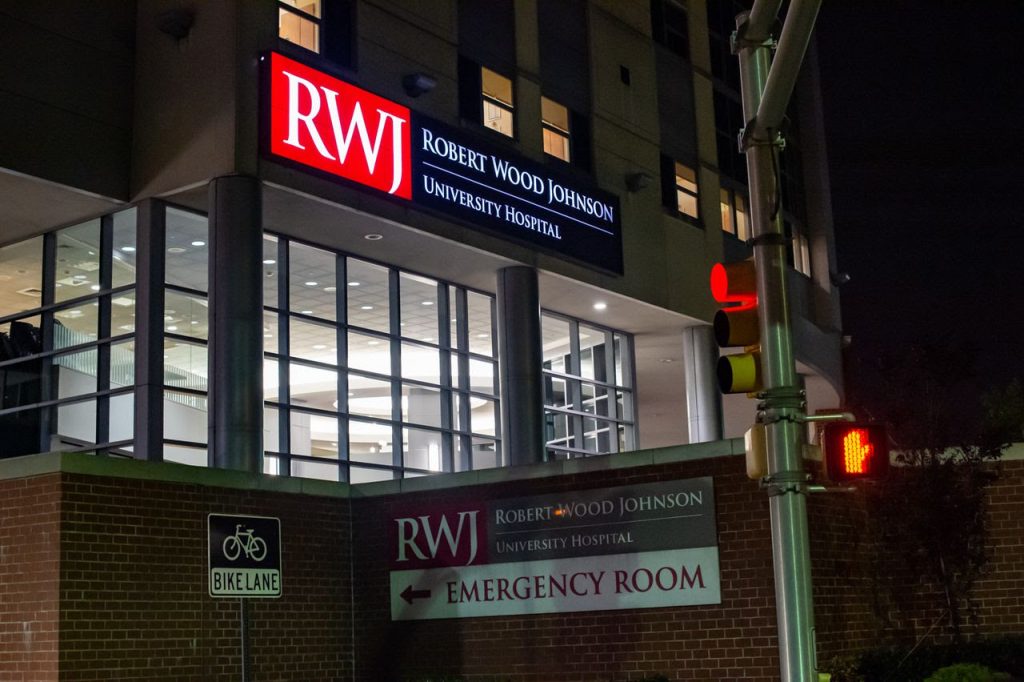Union-busting alleged around Rutgers-RWJBarnabas hiring practices


When RWJBarnabas Health and Rutgers joined forces four years ago, they hoped the state’s largest university and its largest healthcare system would attract new research faculty, improve residency and fellowship programs, expand access to clinical trials, and give New Jersey world-class medical care.
RWJBarnabas, a 12-hospital network, even pledged $1 billion over 20 years to the partnership, which is credited with hiring 60 new research faculty members, encouraging newly-minted doctors to practice in the state, and expanding access to clinical trials, including ones for the COVID-19 vaccine.
But not everyone is happy with all the alliance’s repercussions.
The union representing doctors, nurses, and other health care workers employed by Rutgers alleges the arrangement caused the loss of union representation for 78 new physicians, with potentially many more to come.
The concern centers around new physician faculty hired to work for Rutgers Robert Wood Johnson Medical School and the Robert Wood Johnson Barnabas Health hospital system.
Union officials say the new physician faculty are recruited, vetted, and offered appointments by Rutgers Robert Wood Johnson Medical School department chairs. Still, theysign contracts for more than 90% of their time with RWJBarnabas, a private enterprise. They also sign contracts with Rutgers, a public institution, for less than one-tenth of a full-time position, giving them a faculty appointment and titles like assistant professor, associate professor, and professor.
But under state law, the new professors do not work for a public institution for enough hours to qualify for representation by the union, the American Association of University Professors-Biological and Health Sciences New Jersey (AAUP-BHSNJ).
“None of these physicians are able to join the union, and it’s essentially what seems to be union-busting,” said Josh Bucher, an emergency room doctor at Robert Wood Johnson University Hospital, a teaching hospital, where most of the new hires work.
Rutgers and RWJBarnabas each deny they are moving unionized workers into non-unionized jobs.
“To the best of RWJBH’s knowledge, no AAUP faculty member has become an RWJBH employee,” RWJBarnabas spokeswoman Carrie Cristello said via email.
The union claims the issue isn’t moving individuals from one position to another; the concern is that the alliance is moving jobs that were covered by the union at Rutgers to RWJBarnabas, where they are no longer union positions.
Keep up with the latest in N.J. schools coverage. Sign up with your email here:
But Cristello said she was unaware of any Rutgers union jobs that will no longer be union positions under RWJBarnabas.
“Certain positions have been created where the majority of their time is performing clinical care for RWJBH, with an incidental faculty appointment,” Cristello said. “The RWJBH clinical physician positions are private sector and were never in the public sector AAUP bargaining unit.”
Rutgers spokesman Zach Hosseini said after the Rutgers-RWJBarnabas affiliation, the university committed not to transfer employees from Rutgers to RWJBarnabas.
“There are no union positions at Rutgers that will no longer be union positions,” he said in an email. “We have continued to hire people into Rutgers, even as existing employees depart, depending on our needs.”
But he could not speak towhether union positions at Rutgersbecame non-union positions at RWJBarnabas. “They are a separate organization, which makes its own hiring decisions based on its own needs,” he said. “We hire based on our own needs.”
According to redacted contract letters obtained by NJ Advance Media, both organizations hire each of these new doctors, called clinically-focused university practitioners (CFUPs). They work more than 90% for RWJBarnabas, and their faculty appointments with Rutgers are contingent upon their positions with the hospital system.
The union filed a complaint against Rutgers with the Public Employment Relations Commission in January 2019, alleging that the university has engaged in unfair labor practices. The complaint also charges that, under the university’s agreement with RWJBarnabas, the alliance sets hours and salaries and evaluates the performance of the health care workers — duties that traditionally have fallen under the collective bargaining agreement with the union.
The university denied the allegations in court filings, sayingit did not have enough information to confirm if the health system had hired professors. It also denied any violations of the Employer-Employees Relations Act and said it did not act with “anti-union animus.”
Diomedes Tsitouras, the union’s executive director, said Rutgers has been deceptive.
“So long as they flip a switch and have [the] fiction that these folks are not full Rutgers employees, they can escape their collective bargaining obligations at any time they wish,” he said.
Tsitouras said somedeparting faculty in the surgery and cardiology departments, and some hospital-based physicianswere replaced within a few months with the new hires in question. He cited a doctor specializing in vascular surgery, one of three, who left and was replaced by a CFUP.
Rutgers hired 34 new physician faculty members from May 2018 to May 2019, but it has not made similar hires since November 2020, Tsitouras said. And there has not been any large growth in any department since this type of hiring began, he said.
Meanwhile, the number of union workers decreased by 45 between 2019 and May 2020, from 1,388 to 1,343, Tsitouras said, adding that if the 78 new CFUPs had been eligible to join the union, it would have grown instead of shrunk.
“Rutgers has never used a health system partner to hire large numbers of full-time, non-adjunct faculty before,” he said. “These faculty do exactly the same job in the same place, in the same way as our 100% Rutgers faculty…They work in the same building, they report to the same chair of medicine or pediatrics, they’re billing under the Rutgers name. The money comes in the same way, they’re doing the same procedures and seeing the same patients and teaching the same residents.”
But the new hires’ contract with RWJBarnabas includes the option for bonuses, in some cases higher pay, and different ways of calculating vacation days on an honor system, Tsitouras said. The new hires are not eligible for Rutgers tuition for their dependent children, and they can be let go with two or three months’ notice instead of at the end of an academic term, a union rule. The new hires also cannot participate in the Rutgers University Senate or faculty council, Tsitouras said.
“Having a parallel, non-unionized workforce is incompatible with the idea of collective bargaining,” Tsitouras said.
Rutgers New Jersey Medical School in Newark, also part of the university, is affiliated with University Hospital in Newark, a public hospital. The union represents 400 physician faculty members there, but they are not affected by the hiring changes, because their hospital is public.
Back in the Robert Wood Johnson emergency room, Bucher has seen record turnover among doctors leaving for other hospitals in the state for raises of 20 to 30 percent. Some such moves have gutted entire departments, said Bucher, who also serves as the secretary of the union’s executive council.
More than 60% of the emergency department physician faculty have been hired since 2016, Tsitouras said, and if high turnover continues for another six years, there could be few union positions remaining.
“We could lose potentially whole entire departments, for what exactly?” Tsitouras said. “Why do these people have to lose access to the union?”
By Tina Kelley | NJ Advance Media for NJ.com
Tina Kelley may be reached at tkelley@njadvancemedia.com